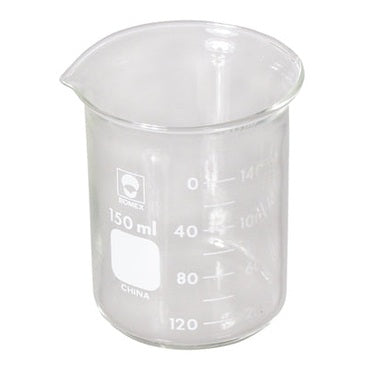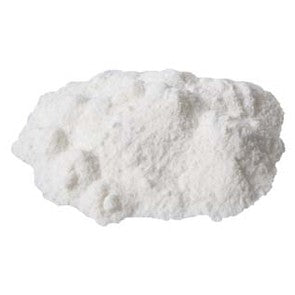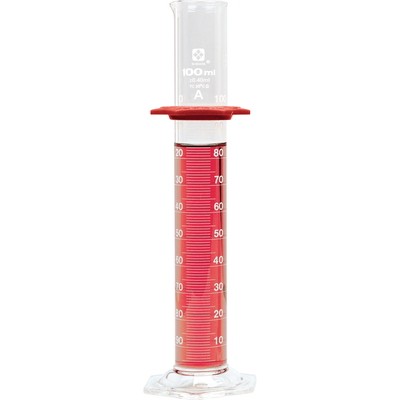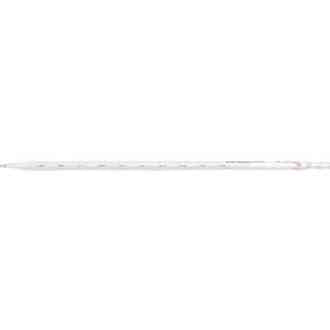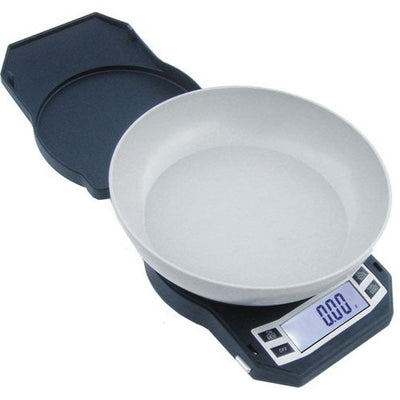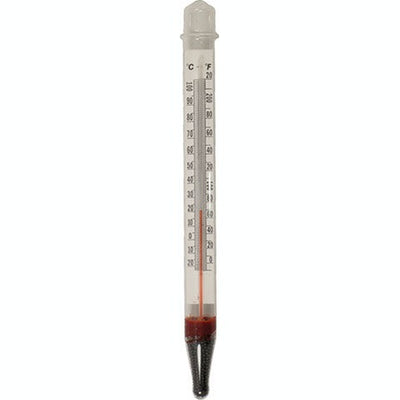Graduated cylinders, pipettes, flasks and more! Everything you need to precisely measure solutions, test certain things in your wine, etc.
Wine Making Glassware & Labware
-
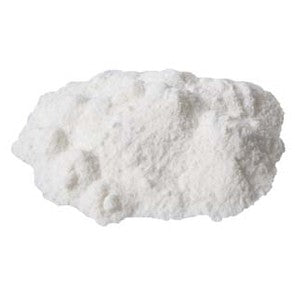
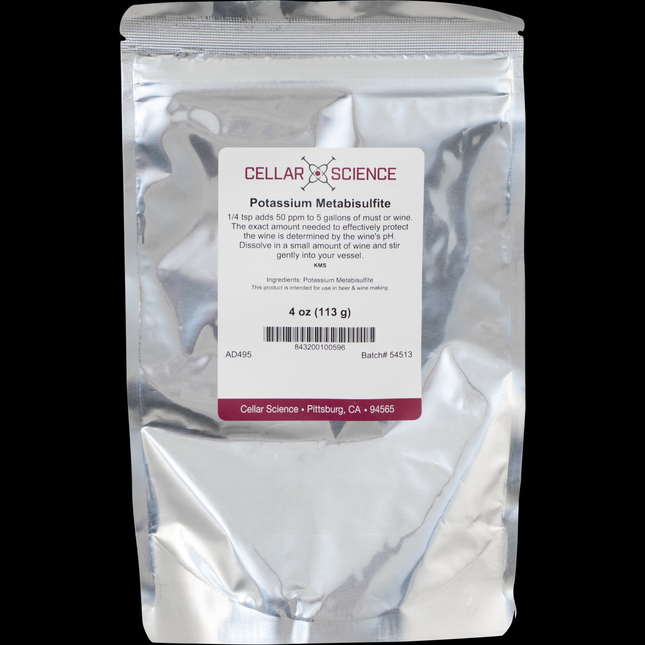
Potassium Metabisulfite
Potassium Metabisulfite, (often referred to as "SO2", "sulfites" "meta", or "meta-bi") has several uses in winemaking. At the crush, sulfites are generally used to help control the spoilage bacteria and indigenous yeast that may already be present both on the fruit and in the winery (i.e. on the picking bins, processing equipment, tanks, tubing, etc). The amount generally used is enough to inhibit most of the unwanted organisms but not enough to hinder a cultured yeast, which has a higher tolerance to sulfites than most of the indigenous organisms do. This inhibition effectively "wipes the slate clean" for the cultured yeast to step in and rapidly colonize the must so that it can effectively dominate the subsequent fermentation. In addition, sulfites also help to inhibit the enzymatic browning of both musts and finished wines so that all of their delicate complexities can be preserved. Later, during storage and in the bottle, sulfites at the proper levels will further protect a wine by continuing to inhibit spoilage organisms, as well as by scavenging oxygen. Note that the exact amount needed to effectively do the job is determined by the pH of the wine. Refer to our MoreManuals! on Red or White Winemaking or one of the winemaking books that we offer for a complete explanation on how to properly manage sulfites. In addition, it's important to keep in mind that free SO2 levels fall faster in wood cooperage than in glass or stainless, so if you are using a barrel you will most likely need to manage sulfite levels more closely. The most common form of Metabisulfite is as a powder which is fixed with potassium or sodium. 1/4 tsp of Potassium Metabisulfite adds 50ppm to 5 gallons of must. Old Metabisulfite loses potency with time and should be replaced every year to assure that you are getting correct levels. You can use old Metabisulfite to make solutions for sanitizing equipment.
$6.99
-
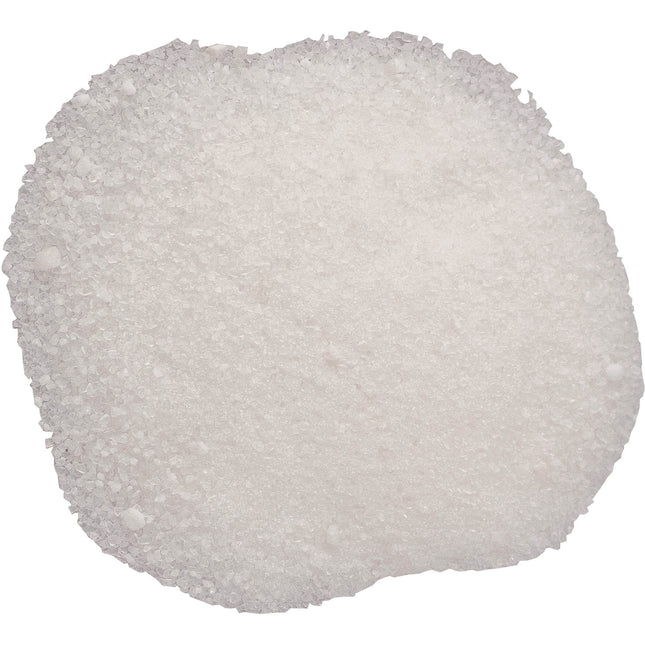
Tartaric Acid
MoreWine!'s Tartaric Acid is processed naturally in Europe from grapes and is the preferred acid for adjusting acid levels in wine. Be aware that a lot Tartaric Acid available to home winemakers is artificially made, comes from China, and does not integrate into the wine as well. Some of this tartaric includes the designation of "food-grade". Because MoreWine! packages this product you can be assured you are getting the highest winery-grade quality. 3.8g per gallon adjusts acidity by +.1%. As a note: some tartaric acid will drop out of suspension as potassium bitartrate if you are doing any cold stabilization. You might want to re-test total acidity after cold stabilization.
$5.99
-
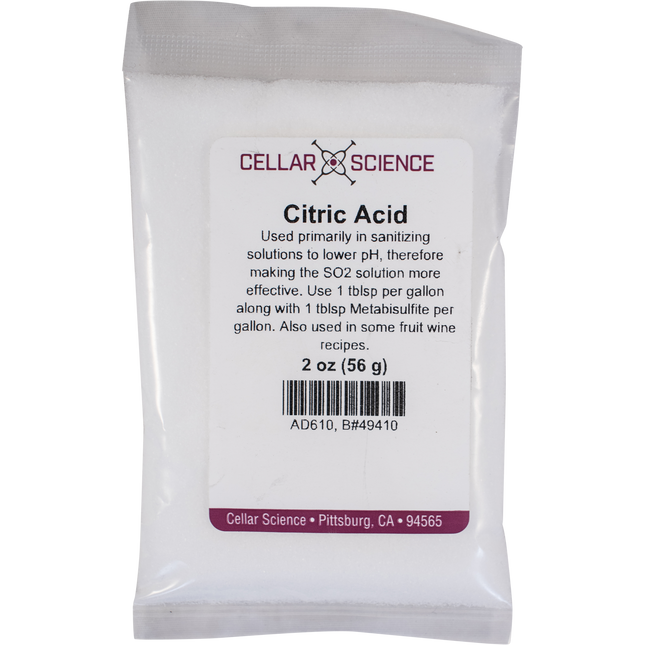
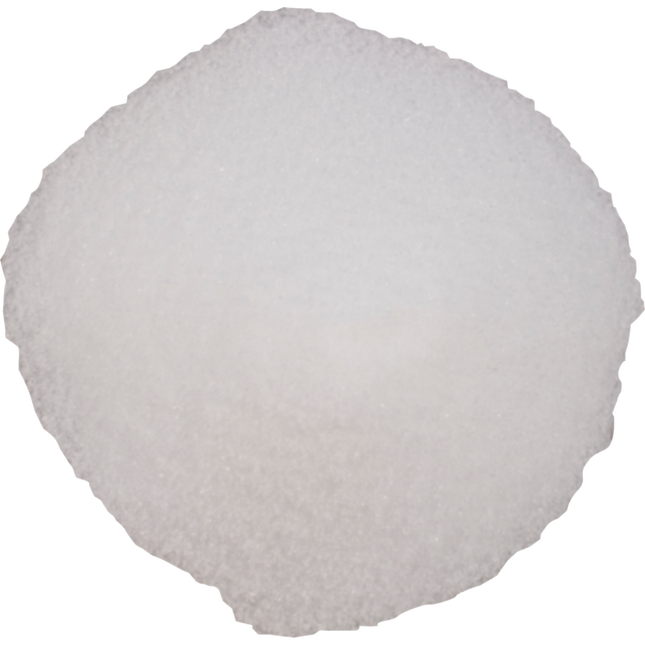
Citric Acid
Used primarily in sanitizing solutions to lower pH, therefore making the SO2 solution more effective. Use 1 tbsp per gallon along with 1 tbsp meta per gallon. Citric is not added directly to must prior to either primary or ml fermentation as its metabolism can lead to volatile acidity. A rough approximate of weight is 1 tsp = 4 grams. We highly recommend using a scale to weigh the product for an accurate dose. We do not recommend relying on these rough conversions for accurate dosage rates. Domestically produced in the USA.
$2.99
-
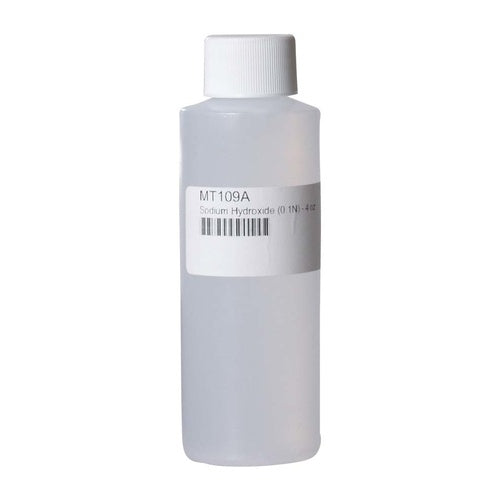
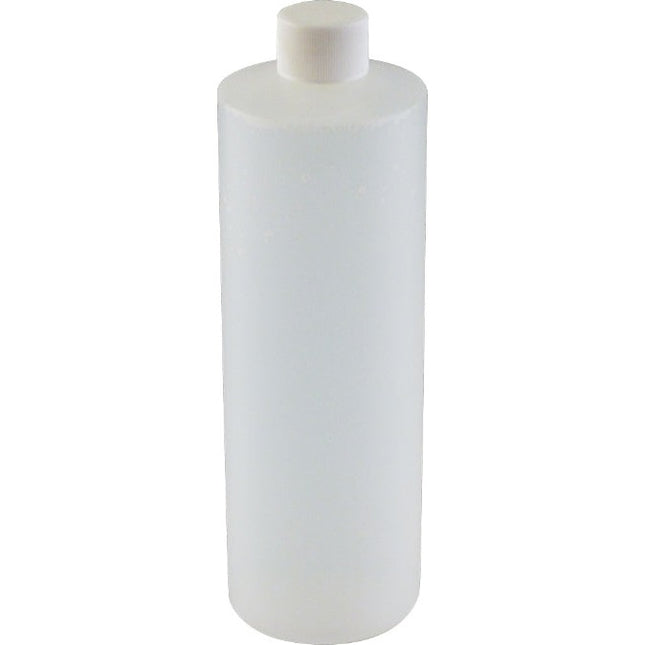
Sodium Hydroxide (0.1 N)
Replacement Sodium Hydroxide for the CellarScience® Acid Test Kit (W501CS) or any other acid test kit which uses 0.1N Sodium Hydroxide. Please Note: This Sodium Hydroxide is 10x stronger than the MT110 product that is used with our MT140 Aeration Oxidation SO2 Test Kit. They are not interchangeable.
$5.59
-
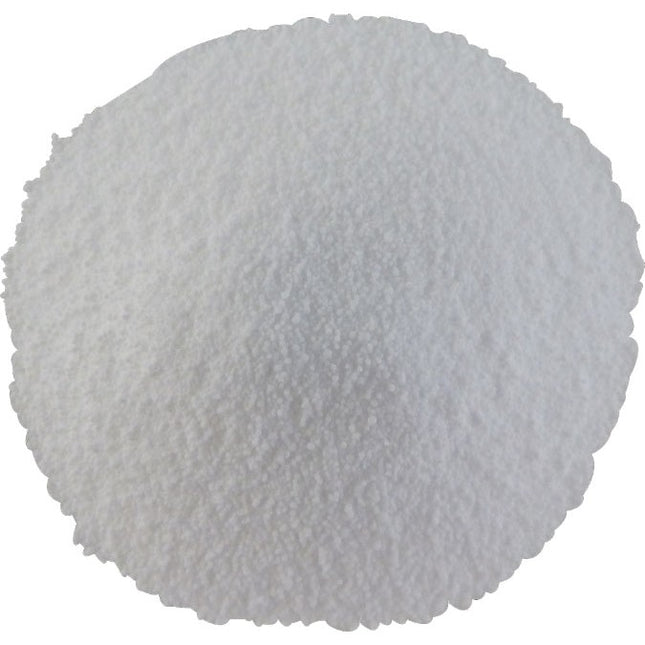
Potassium Carbonate
Potassium Carbonate is used to lower acidity levels in wine. 3.8 grams per gallon will reduce acidity by about .1%. Potassium Carbonate requires that the fermenter be stored cold for several weeks after application (please see our guides to Cold Stabilization in the documents tab above). During the period of cold stabilization the tartaric acid drops out as potassium bitartrate. Doing a trial run with a small amount is strongly suggested to determine exactly what the drop in acidity will be. Calcium carbonate can be used in a similar manner and does not require cold stabilization. However it adversely affects flavor, takes month to precipitate out of solution, and preferentially reduces tartaric acid first before affecting malic or citric acid. A rough approximate of weight is 1 tsp = 8.3 grams. We highly recommend using a scale to weigh the product for an accurate dose. We do not recommend relying on these rough conversions for accurate dosage rates.
$1.99
-
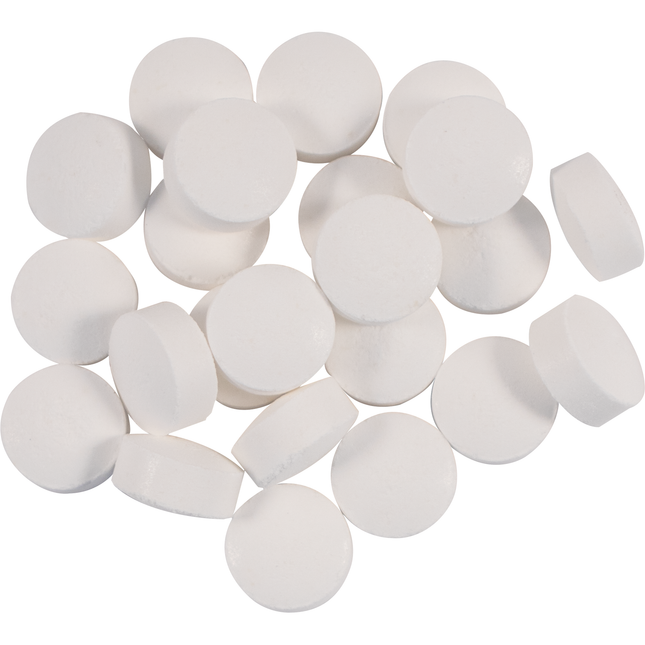
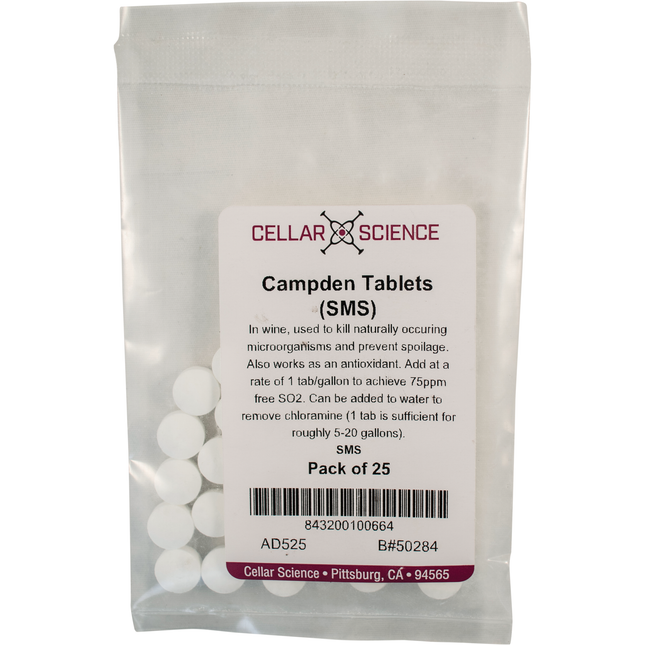
Campden Tablets - Sodium Metabisulphite (25 Tablets)
An essential ingredient in winemaking. Sodium Metabisulfite, (often referred to as SO2, sulfites meta, or meta-bi) has several uses in winemaking. It is used at the crush, to help control the spoilage bacteria and indigenous yeast that may already be present on the fruit or the equipment. The amount used is enough to stop most of the unwanted organisms but not enough to hinder a cultured yeast, which has a higher tolerance to sulfites. This effectively “wipes the slate clean” for the cultured yeast to step in and rapidly colonize the must. Sulfites also help to inhibit the enzymatic browning of musts and finished wines. During storage and in the bottle, sulfites at the proper levels will protect a wine by continuing to inhibit spoilage organisms, as well as by scavenging oxygen. Campden tablets are Sodium Metabisulfite in an easier to measure format. Adds 75 ppm of sulfites at the rate of one tablet per gallon. These must be fully ground-up prior to use. Potassium Meta-bi in powder form, AD495 or AD500, is much easier to use if you have a scale and does not add sodium to your wine. It is possible the sodium could contribute a very small salty flavor. Especially when making white wine it is preferable to add potassium over sodium since added potassium can later help with cold stabilization. For more information refer to our MoreManuals! on Red or White Winemaking or one of the winemaking books that we offer for a complete explanation on how to properly manage sulfites.
$1.99
-

Solvent/Developer for Chromatography Kit
Refill solvent for our Chromatography kit. 200ml. Contains n-butanol, formic acid and bromocresol green. Should be used in well ventilated area.
$64.99
-


Plastic Syringe | 10 mL | Center Nozzle
This plastic syringe is perfect for measuring out acid additions or other small amounts of liquid. Perfectly suitable for multiple uses in brewing and winemaking applications. Calibrated up to 10 ml. 1 ml is equal to 1 cc. NOTE: The center nozzle syringe is not compatible with the Anton Paar EasyDens. You will need a syringe with offset nozzle.
$2.19
-
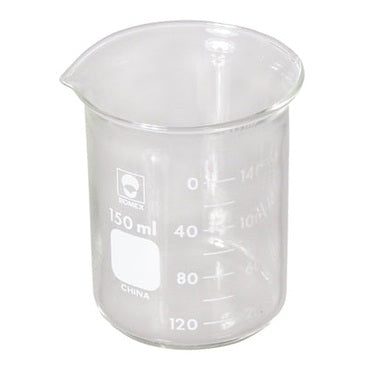
Beaker - 150 ml
Great for vineyard and tank sampling, and for use as a reaction vessel for TA Testing. Especially when determining the endpoint by pH, the larger vessel ensures you have room for a pH electrode, temperature probe and can still easily add your Sodium Hydroxide with ease.Laboratory grade borosilicate glass can be rapidly heated or cooled without cracking and is generally shatter resistant.
$4.99
-
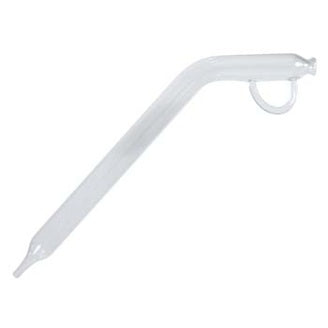
Glass Wine Thief - Economy
A unique, functional variation of the traditional glass wine thief. We ordered these from eastern europe where the pricing/quality is great. The design was supposed to look exactly like our traditional thiefs we have made locally in Berkeley, California. Thus we used a picture of the original thief in our latest catalog. But alas, when they arrived they looked unlike any wine thief we have seen. But.... they work fantastic so we are happy and we think you will be too! Upon further testing and working with this thief, it has become clear that it can be tempermental about which carboys it fits in. If you'd like a glass thief for a carboy, we have to recommend the MT345. This still works great for barrels, even stacked ones! 1" in diameter, 10" from the bend to the tip and about 14" total length.
$32.99
-


Sodium Hydroxide (0.01 N)
Sodium Hydroxide (0.01 N)
$9.99
-

Pipette (10 ml)
Used to measure small amounts of fluid. Used in winemaking to measure the correct amount of wine for a residual sugar test using a clinitest tablet. This glass pipet is designed as To-Deliver, not To-Contain, meaning that you do not want to blow out the last little bit in the tip after the sample drains out or you will deliver more than your measured amount.
$6.49
-

Floating Thermometer | 8" | 0-220°F
Floating glass thermometer is great for mashing, monitoring wort temperature for yeast pitching, and of course, making cheese. The sealed glass housing can float in liquid, making it easy to monitor the temperature. 8" long, 0-220 degrees Fahrenheit range.
$7.69
-

Phenolphthalein - 1% 1oz
Replacement jar of phenolphthalein indicator for the W501 Acid Test Kit. This phenolphthalein is suitable for acid test kits from other suppliers as well. Phenolphthalein will often turn colorless in acidic solutions and red in basic solutions.
$4.99
-

Wine Thief - Glass
Hand-made by local artists right near our headquarters in Berkeley, California. This is our best thief by far and is our staff favorite. You can just feel the quality and craftsmanship of the piece when you pick it up. It has that kind of weight to it. Tested in our wine room and tested in the field. You cannot go wrong with this piece whether you are a pro wine maker or a home winemaker who makes professional quality wine. We have been selling this same thief for years now, and it's ideal for sampling wine from glass carboys or barrels. Taking a sample out of a barrel just feels right with this tool. This hand-blown glass wine thief holds approximately 50 ml of liquid -- the perfect amount for sampling and using for testing. This is the thief you dream about! Approximate dimensions 3/4 in. diameter x 1 ft. long before the bend.
$84.99
-


Campden Tablets (Potassium Metabisulfite)
In wine, used to suppress naturally occurring microorganisms and prevent spoilage. Also works as an antioxidant. Add at a rate of 1 tab/gallon to achieve 75 ppm free SO2. These tablets use potassium metabisulphate as opposed to sodium metabisulphate. Potassium based campden tablets are generally preferred by winemakers who do not want to add excess sodium into their wine. Can also be added to water to remove chloramine (1 tab is sufficient for roughly 5-20 gallons)
$1.99
-


Laboratory Wash Bottle
A handy addition to any Home Lab, this wash bottle is great for cleaning out pipettes after use, rinsing pH electrodes and cleaning out components of your Aeration/Oxidation set. Also fun to squirt people with!
$17.99
-

Glass Wine Thief - Barrel, Bent
Due to high demand, this item is currently out of stock. Be the first to receive your items by placing a pre-order today. We will automatically ship this to you when we receive more in mid February. Heavy Duty Glass Wine Thief -- 18" long, 1.25 inches thick, with glass "D" handle and bent to work with stacked barrels. Very sturdy and perfect for sampling for testing as well as for winery events. Because of the larger diamter and volume, this unit will not fit into the neck of glass carboys.
$114.99
-


Sample Taker/Thief - 3 Piece
The sample taker we prefer because it can broken down into three pieces for easier sanitization. 3 plastic pieces with an assembled overall length of 18''.
$12.99
-

Erlenmeyer Flask - 500mL
The perfect container for rehydrating yeast or mixing up additions. Erlenmeyer flasks allow you to swirl your yeast or acid, tannins, nutrients, etc. into solution. The clear glass allows you to see when the solution is fully mixed. In the lab world, these are known as "Student Grade" Made from Borosilicate glass, it can be rapidly heated or cooled without the risk of cracking. Features 500ML Capacity Made from Borosilicate Glass Fantastic price for a flask of this size Produced for MoreWine! Kegland Part Number: KL03964
$12.49
-

Pipette Filler
Safety Bulb pipette filler for use with solutions that should not be mouth pipetted. In general, it is best to use the filler with anything that is not a wine sample.To Use: Squeeze filler and place on top of the pipette. Place the pipette in the solution, allowing the bulb to re-expand, drawing liquid into the pipette. Draw liquid up past the point in the pipette that you would like it filled to. Now, being careful not to draw up excess liquid or squeeze out what you have in the pipette, quickly remove the squeeze bulb and place your index finger tightly over the top of the pipette. Now by gently lifting your finger, you can allow the liquid to run out to the level that you're looking for.**Tip:** Be careful not to draw your liquid up into the filler. Many chemicals that are used around the lab can degrade the filler and cause poor sealing, making the filler harder to use. A great way to get a feel for the tool is to practice for a little while with some water, until you can easily remove the filler and seal the pipette with your finger.
$11.99
-

Pipette (5ml)
Good for measuring lactic acid and other chemical solutions in small quantities. This glass pipet is designed as To-Deliver, not To-Contain, meaning that you do not want to blow out the last little bit in the tip after the sample drains out or you will deliver more than your measured amount.
$6.49
-

HCL 0.01 N - 1 oz
A 1oz bottle of 0.01N Hydrochloric Acid, used in our MT140Home SO2 Test Kit. Store in a cool, dry place. 3-4 month shelf life at room temp once opened. Can last a little longer in the fridge, but please allow to come to room temp before using in your tests.
$8.99
-


Ascorbic Acid
Ascorbic acid is a quick-acting and powerful antioxidant that is used in white winemaking to protect against light and short aerations, such as racking and bottling. It works by rapidly converting dissolved oxygen into hydrogen peroxide before it has a chance to react with oxidative enzymes and cause browning. However, this hydrogen peroxide itself needs to be removed from the wine in order to avoid the very phenomenon that was trying to be avoided in the first place, namely oxidizing the wine. The answer lies in always making sure that the free SO2 levels are correct, both before the ascorbic addition is to be made and after. (Note that "Titrettes" are not accurate enough for this, and that a more precise means of determing free SO2 is needed, such as an Aeration-Oxidation set-up). Addition rate is around 50 mg/l (ppm) as long as the free SO2 is maintained at 30 mg/l (ppm). A rough approximate of weight is 1 tsp = 3.2 grams. We highly recommend using a scale to weigh the product for an accurate dose. We do not recommend relying on these rough conversions for accurate dosage rates.
$2.49

